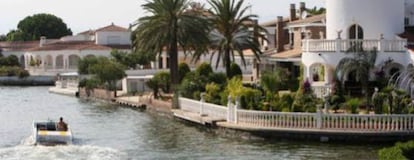Cabinet gives green light to Coast Law reform to save seaside homes
Overhaul will prevent thousands of beachfront houses from being demolished

The Cabinet on Friday approved a reform of the Coast Law extending an amnesty for the owners of beachfront properties that would otherwise have to be demolished.
Owners of properties that were in breach of the current legislation, many of them foreigners, were given a 30-year concession of use that was due to expire in 2018.
The overhaul of the current law, which has been in place since 1988, also creates a special regime for 11 areas, which will be taken out of the public domain. It also established four-year concessions for beach bars and restaurants.
The surface easement limits, or protection areas, for rivers could be reduced from 100 meters to 20 meters.
The text of the draft reform said the current legislation “has tolerated outcomes that are not acceptable in environmental terms,” adding that “time has consolidated certain situations,” and that the law has “prompted mistrust and uncertainty.”
“The aim of the reform is to avoid the risk of homeowners losing their property rights in the short term, and particularly bearing in mind the difficulties this could create for foreigners,” the text also says.
Owners of beach properties now have the right to sell them and to carry out refurbishments with prior permission provided these do involve any increase if the size of the home.
The law established a demarcation boundary that forbids private ownership in areas classified as being in the public domain, made up of the surf zone and the beach, in which there can be no private ownership. Inside this public domain everything belongs to the state. The second zone, which includes land running inland up to about 500 meters, imposes restrictions on private ownership.
The new legislation also establishes a special boundary demarcation for the Balearic island of Formentera, “given its special geographical configuration.”
The 10 other beachfront areas afforded special status that excludes them from the public domain are Rocafel and Puerto de Santa Pola in the province of Alicante, Marina de Empuriabrava and Platja d’Aro in the province of Girona, Punta Umbría and the historic centers of Isla Cristina and el Caño del Cepo in the province of Huelva, Pedregalejo and El Palo in Málaga and Oliva in Valencia.
This will save an estimated 10,000 properties from demolition.
Environmental groups have criticized the change to the law, which they consider to be more permissive.
Tu suscripción se está usando en otro dispositivo
¿Quieres añadir otro usuario a tu suscripción?
Si continúas leyendo en este dispositivo, no se podrá leer en el otro.
FlechaTu suscripción se está usando en otro dispositivo y solo puedes acceder a EL PAÍS desde un dispositivo a la vez.
Si quieres compartir tu cuenta, cambia tu suscripción a la modalidad Premium, así podrás añadir otro usuario. Cada uno accederá con su propia cuenta de email, lo que os permitirá personalizar vuestra experiencia en EL PAÍS.
¿Tienes una suscripción de empresa? Accede aquí para contratar más cuentas.
En el caso de no saber quién está usando tu cuenta, te recomendamos cambiar tu contraseña aquí.
Si decides continuar compartiendo tu cuenta, este mensaje se mostrará en tu dispositivo y en el de la otra persona que está usando tu cuenta de forma indefinida, afectando a tu experiencia de lectura. Puedes consultar aquí los términos y condiciones de la suscripción digital.








































